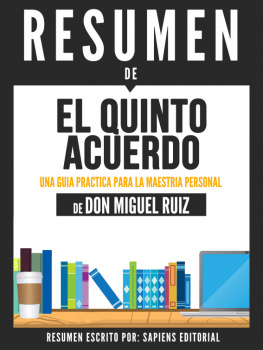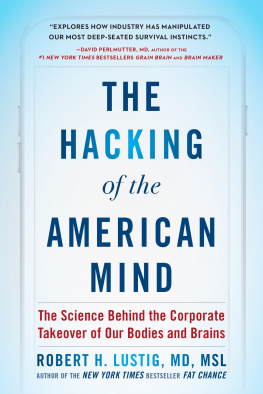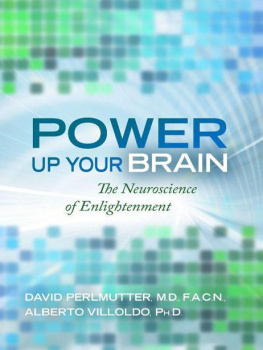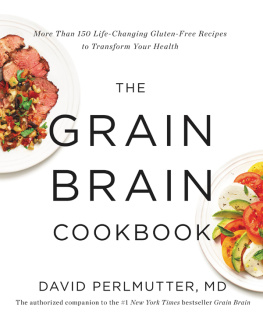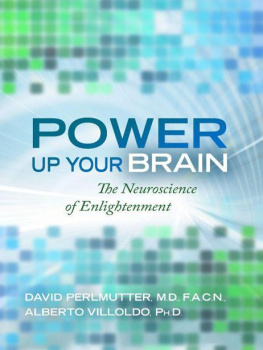SAPIENS EDITORIAL
Summary Of "Grain Brain: The Surprising Truth About Wheat, Carbs, And Sugar - Your Brain's Silent Killer - By David Perlmutter"
Sapiens Editorial
2017 Sapiens Editorial /Sapiens Editorial
All rights reserved.
Author: Sapiens Editorial
Contact Data (contact@sapienseditorial.com)
ISBN: 9783963132452
SUMMARY OF
GRAIN BRAIN
THE SURPRISING TRUTH ABOUT WHEAT, CARBS, AND SUGAR--YOUR BRAIN'S SILENT KILLERS
BY DAVID PERLMUTTER
SUMMARY WRITTEN BY:
SAPIENS EDITORIAL
DESCRIPTION OF THE ORIGINAL BOOK
In this book, the author Dr. Perlmutter, links neuroscience with nutrition to show the risks in which we are exposed to the intake of cereals, sugar and carbohydrates; foods especially harmful to the brain.
In turn, it proposes a path to assume a new healthier lifestyle that includes fundamental nutritional supplements, exercise routine and meditation, restful sleep and an adequate rhythm in activities.
This work is a worldwide bestseller and has earned excellent opinions from scientists and the general public.
CONTENT
WHEAT: A HUGE KILLER
If you ask the elderly what people died from when they were young, they would probably respond "from old age". Perhaps, they will tell you the story of some acquaintance who died of tuberculosis or dysentery. However, no one would mention diabetes, cancer, heart disease, or dementia.
Since the mid-twentieth century, specific diseases have emerged that have become immediate causes of death for people who no longer die of "natural causes". These are chronic and degenerative diseases, which affect the body and brain. Among them is Alzheimer's.
Genetic reasons are frequently attributed to the onset of these diseases; it is said that we come into the world predestined to suffer from them and that surely we will suffer if we live more than 80 years.
Dr. Perlmutter's research led him to say that this is not the case at all. The culprit is not your DNA but the food you eat. Brain dysfunction begins with consuming bread daily.
What is the reason? Modern wheats are destroying your brain. In this group are refined flour, pasta, rice, whole grain, live grain, ground grain, among others. The dietary changes that have taken place in recent years, which replaced a diet high in fat and low in carbohydrates for a low fat and high in carbohydrates (which mainly consists of cereals and other harmful foods) are the sources of many modern diseases linked to the brain, including headache, insomnia, anxiety, depression, epilepsy, motor disorders, schizophrenia, hyperactivity.
Lets compare to our Neolithic ancestors. As a species, at a genetic and physiological level, we are identical to them. These men who lived before agriculture, consumed grains, but they did in such minute quantities, when compared to current consumption. Even the variety of wheat to which they had, has nothing to do with today's wheat. With modern hybridization and DNA manipulation, the wheat we consume today is nothing like the wheat from hunter-gatherers from thousands of years ago. There lies the problem. We are challenging our body by forcing it to receive ingredients for which we are not genetically prepared.
Let's think about some interesting facts.
First, it was only 10,000 years ago that we introduced specially prepared, non-wild grains into our diet. If we compare that span of ten thousand years with the 2.5 million years of evolution that preceded the introduction of those grains, it really is a very short time.
It is easy to understand that our bodies have not had enough time to evolve to consume grains in large quantities, approximately 133 pounds each year. Therefore, if the human body was prepared for small amounts of grain and in a short time we began to give it enormous amounts, its logical that the body cannot support it and is resentful.
INFLAMMATION: THE KEY IN THE DEGENERATIVE PROCESS
Scientists say the key to degenerative conditions, including brain diseases, is inflammation.
How does it develop? It has been discovered that gluten attached to a high carbohydrate diet is the most obvious reason for the inflammatory reactions that reach the brain. The worst thing about this is that we do not realize that our brain is being affected. While digestive disorders and allergies give us warning signals, the brain can withstand these aggressions without us feeling it.
Remember that when we introduce an inflammatory agent to our brain we are predisposing ourselves to irreversible diseases: chronic headaches, depression, Alzheimer's.
WHAT WE BELIEVE
Dr. Perlmutter frequently uses a simple test that shows the lack of knowledge of the nutritional values of what we eat. He presents to his audience a picture of four common foods: a slice of whole wheat bread, a bar of chocolate, a spoonful of pure white sugar, and a banana. With them in view, he asks the public to choose which produces the highest increase in blood sugar level, which has the highest glycemic index. The glycemic index ranges from 0 to 100, with higher values given to foods that cause the fastest increase in blood sugar.
Nine out of ten people choose the wrong food. It's not sugar, it's not the candy bar, it's not the banana. It is whole wheat bread. Wheat increases blood sugar more than table sugar.
It is a reality that spikes in blood sugar levels are bad for the body. It is therefore important to regulate those levels. We must remember then, that wheat bread is very harmful.
CHOLESTEROL: FUNDAMENTAL NUTRIENT
The brain needs cholesterol to function properly. Cholesterol is an essential nutrient for neurons and as a structuring element of cell membranes. It also works as an antioxidant and is the precursor of other substances like vitamin D and certain hormones like testosterone and estrogen.
Neurons are unable to generate the amounts of cholesterol they need by themselves, so they depend on the one that carries the protein that, curiously enough, doctors call "bad cholesterol." That protein is neither good nor bad. It is a low-density lipoprotein whose main role in the brain is to capture cholesterol and transport it to the neuron that requires it.
Scientific evidence shows that when cholesterol is low the brain does not work properly. Individuals with low cholesterol levels are more exposed to dementia and other neurological problems. Lack of memory and Parkinson's disease are also associated with low cholesterol levels.
Curiously, the human body needs to ingest carbohydrates is zero. The human body can survive with a minimal amount of carbohydrates that can be supplied by the liver.
A fundamental suggestion: respect your genome. Fat is the preferred fuel for the human metabolism. Eating high cholesterol foods does not have any negative impact on our actual cholesterol levels, and the alleged relationship between high cholesterol and higher heart risk is an absolute misconception. Nothing is farther from reality than the myth that if we lower our cholesterol levels we will live longer and healthy.
THE TRUTH ABOUT SATURATED FATS
Saturated fats like those found in meat, egg yolks, cheese and butter, have a bad reputation among people. They have convinced us so much that they are bad, that we no longer question why.
In fact, our body needs saturated fats, because it is designed to work with the consumption of them. Think about how when you were a baby and your mom breastfed, saturated fats were your main food, because 54% of the fat in breast milk is saturated.
A particular saturated fat, palmitic acid 16, produces pulmonary surfactant and contributes to the alveoli being able to expand. Without that fat it would not be possible to breathe, because the alveoli would stick. Having a healthy lung surfactant prevents asthma and other respiratory diseases.
Next page

